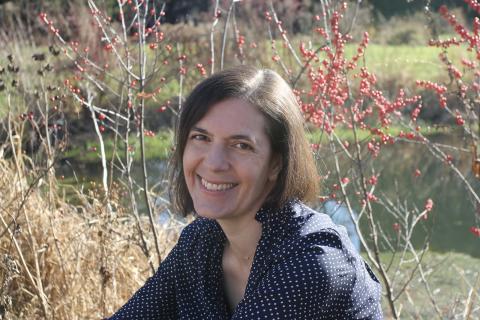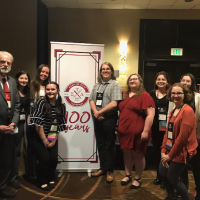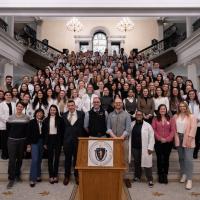
Poet and Faculty Member Rebecca Olander Opens Doors for Fellow Writers

Rebecca Olander began teaching English at Westfield State University in 2012. After earning degrees from Hampshire College, Smith College, and the Vermont College of Fine Arts, Olander began teaching English courses at the University, such as composition, creative writing, and poetry. Her own personal work as an author and poet largely translates to how she operates as a teacher, mother, and creative spirit.
“I’m someone who cares deeply about writing in my own life,” she said. “I publish my work, and it involves a lot of failure and rejection. It’s a long road, so I love being able to be a model of what that looks like… somebody who’s in the trenches doing the work.”
In addition to teaching, Olander is the director of Perugia Press, a nonprofit press which aims to uplift and amplify women authors. Founded in 1997 by Susan Kan who endeavored to help other emerging artists in their quest to publish creative work, forming the press as a vehicle by which women were able to take up more space in the publishing world.
“We really try to make sustainable, nonperformative actions in the world with the intention of making space for marginalized voices,” Olander said. “One thing we do is have a monthly spotlight at Perugia, called the ‘Emerging BIWOC Poet Spotlight’. So, every month, we feature a Black, Indigenous, or woman of color poet who has not more than one book in the world, but at least one collection. We showcase that poet, one selected poem, where to buy it, her biography, and her website. We give them that platform. In turn, we hope this will make our press feel like a welcoming place to submit their work.”
Much of Olander’s own creative work speaks to the different identities she’s undertaken throughout her life. From teaching in high schools to universities, to earning a Master of Fine Arts degree, becoming Director of Perugia Press, and becoming a mother, Olander described each role as “informing the other”, which has been cathartic to express through her writing.
“Poetry is so enmeshed in my personhood,” she said. “I walk around as a human in the world, and for me, I think of poetry as life. It’s breath, it’s survival. It’s what I know and what I need. It’s the way I organize and understand the world. It’s about communicating all of that to others and then being part of the community of voices that is in the world. To me, poetry means community.”
This can be reflected in Perugia Press’ tiered submission process, with women being able to pay a reduced date or choose a fee-free option, as the publishing industry has historically excluded those who originate from low socioeconomic backgrounds and/or are women of color. The press is a nonprofit and accepts donations in order to run and continue to offer a safe space for authors to be able to share their work. “It’s meant to address the fact that it’s been harder for women of color to navigate the submission landscape,” she said. “And so we’ve pledged to do this until we have a more representative catalog overall for our press.”
A wider array of art to engage with also leads to a fuller perspective on the world and those in it. Poetry is a natural process for narrative storytelling, and readers who consume a more diverse amount of writing will also similarly have their own imaginations expanded. This phenomenon, seen throughout the history of literature, is also why Olander feels so called to the craft.
“To stand in the shoes of a poet and see what she’s doing, what she has to say about her life… it’s my mission to bring love of poetry to my students and to write the wrong that has been done in poetry. It should not be something that’s inaccessible or lacking joy. It should be something we can love and celebrate. Poetry can break your heart, and it can save your life at the same time. It’s not something that closes worlds. It’s an opening device.”


